7 start with E start with E
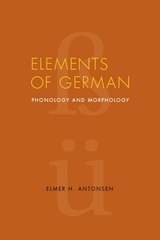
Elements of German fills a gap in advanced undergraduate and beginning graduate levels of German language study by presenting more advanced concepts of the language in a light intended for practical use rather than theoretical discourse. This text provides a means to improve knowledge and command of grammatically correct German as it is spoken and written. It also introduces methods and tools of linguistic analysis in the areas of phonology and morphology. Unlike books that treat phonology in a cursory way, this text delves into the problems of word formation and the intricacies of inflection and derivation. Exercises are included throughout to help better absorb the rules for real-world language use. This volume provides an in-depth look at the German language from the ground up. Its detailed approach makes this book an excellent complement to the work of less specific grammar textbooks and reviews.
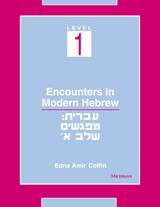
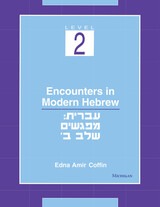
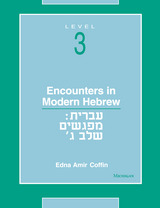
This volume shows students a wider range of Hebrew-speaking cultural activities in a larger human context, from materials about holidays, including a Jewish holiday celebrated only in North Africa, to discussions of the roles of women that raise the issue of gender equality. Other chapters examine ethnic jokes and their problematic qualities, geography, and the differences between popular and literary language registers. Encounters in Modern Hebrew, Level 3 ushers the Hebrew student through a wide domain of the human community.
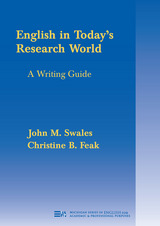
In addition to instruction on writing for publication, English in Today's Research World provides needed advice on applications, recommendations, and requests--types of communications that are particularly vulnerable to influences from national cultural expectations and conventions and that, therefore, place the NNS writer at increased disadvantage.
The text is both a reference manual and a course book, so that researchers can continue to use the book after they have completed their formal education. New ESL/EFL teachers can use English in Today's Research World as a reference book for themselves or as a teaching aid in the classroom.
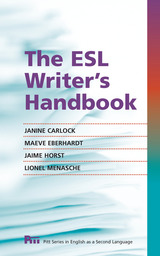
The ESL Writer’s Handbook is a reference work for ESL students who are taking college-level courses. Because its purpose is to provide help with the broad variety of writing questions students may have when working on school assignments, the text focuses on
English for Academic Purposes. Unlike other handbooks on the market, this book’s sole purpose is to address the issues of second language learners.
This spiral-bound Handbook complements a student writer’s dictionary, thesaurus, and grammar reference book. It would be suitable as a text for an advanced ESL writing course when used together with the companion Workbook (978-0-472-03404-8). The Handbook is concise and easily navigated; is accessible, with clear and direct explanatory language; features information on both APA and MLA styles (including a sample paper for each); and includes many examples from ESL student writers to provide realistic models.
Included as special features in the Handbook are:
• The topic selection is based on ESL writers’ needs as observed by the authors over many years.
• The coverage of topics is more complete than the limited amount usually provided for ESL writers in first language or L1 handbooks.
• The explanatory language is appropriate for ESL students, in contrast to the more complex and idiomatic language of other English handbooks.
• The level of detail is more manageable for ESL students, compared to what is in other English handbooks.
- Many of the examples of paragraphs, essays, research papers, and exercise sentences were written by ESL students; this encourages users of this Handbook to realize that they can also become effective writers.

A highly communicative approach to Intermediate Russian grounded in everyday culture and authentic texts
Etazhi uses the communicative approach to advance student’s Russian proficiency from the Novice High / Intermediate Low level of the ACTFL scale to an Intermediate Mid / Intermediate High level. Designed for one academic year of instruction, Etazhi engages students with highly relevant topics to internalize new vocabulary, expand their grammatical reach, and deepen their cultural understanding of Russian speakers.
Chapters on Russian daily life, travel, dating and marriage, clothing, cuisine, health and medicine, education, holiday traditions, and careers are infused with humor and help students acquire the vocabulary and cultural nuance needed to discuss Russian literature, culture, and the arts. Hundreds of authentic texts, photographs, and illustrations gathered from across the Russian Federation–including authentic material written by real people about their experiences in Russia–show the diversity of Russian speakers, culture, and society. Each of the six chapters contains approximately fifty exercises that help students practice the four basic language skills–listening, speaking, reading, and writing.
This textbook improves vocabulary and grammar while promoting deeper cultural competency, preparing students to study abroad, and providing a firm foundation for advanced courses.
Special features include:
- Audio transcripts to aid in comprehension checks (available for free on the Press's website)
- A grammar reference with charts and tables, including case and verb charts
- An extensive Russian-English glossary
- Over 120 authentic photographs and hand-drawn images by a Russian artist
- A sample of presentation materials and a sample exam for chapter one to aid instructors (available for free on the Press's website)
READERS
Browse our collection.
PUBLISHERS
See BiblioVault's publisher services.
STUDENT SERVICES
Files for college accessibility offices.
UChicago Accessibility Resources
home | accessibility | search | about | contact us
BiblioVault ® 2001 - 2024
The University of Chicago Press









